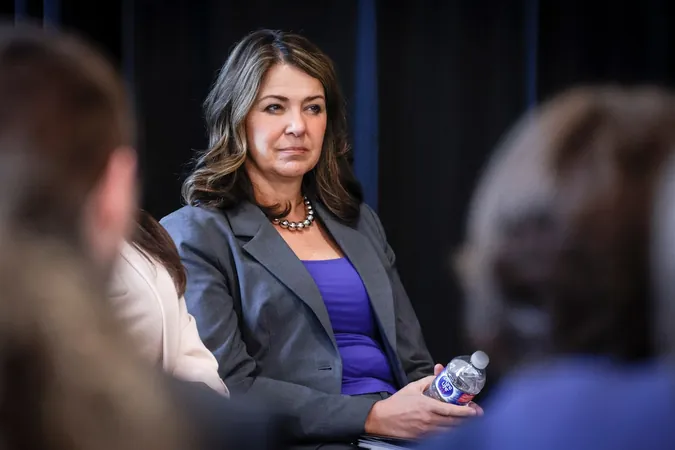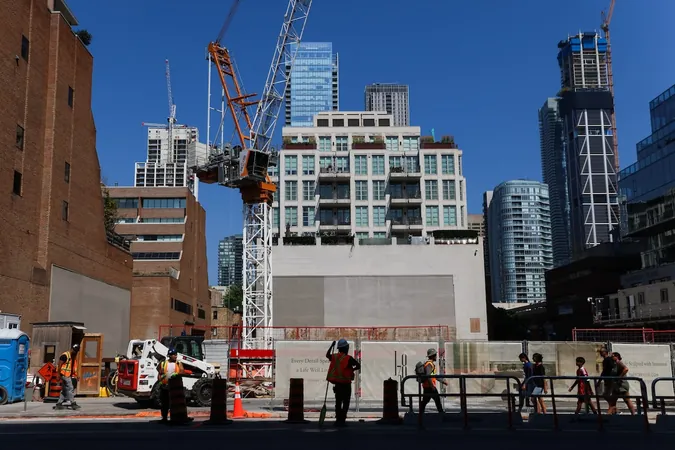
Alberta's Premier Faces a High-Stakes Gamble with Carbon Capture Initiative
2025-09-01
Author: Sophie
Alberta’s Premier, Danielle Smith, achieved a significant political win recently with the appointment of Dawn Farrell, a seasoned energy executive, as the inaugural CEO of Canada’s Major Projects Office based in Calgary.
However, this victory comes with considerable risk. For months, Smith urged Prime Minister Mark Carney to translate his verbal support for oil and gas infrastructure into tangible action. With Farrell, a fellow Albertan and former adviser to Smith, now in a pivotal position, there are high hopes for collaboration.
"I’m thrilled that the Prime Minister and I share a vision, and that he recognizes her as a key advisor," Smith stated confidently during a press conference, anticipating close cooperation with Farrell.
Farrell’s first major task will be to collaborate with the Prime Minister on a shortlist of projects that can benefit from expedited regulatory procedures and funding. Speculation is rife that this list will prominently feature the ambitious $16.5-billion carbon capture and storage (CCS) project backed by the Pathways Alliance—a consortium of six oil sands producers.
Yet, it’s widely believed that any proposals for new oil pipelines, a long-time advocacy of Smith’s, will be conspicuously absent. Despite calls from operators like TC Energy to bolster natural gas connections to deep-water terminals, there’s a notable disinterest in pushing for additional oil pipelines.
Mark Maki, Farrell’s successor at Trans Mountain, recently echoed this sentiment, suggesting that oil producers should maximize existing pipeline utilization before considering new developments.
As a firm advocate for decarbonization, Prime Minister Carney and energy executives are leaning heavily on CCS as a crucial step toward rendering oil sands production more eco-friendly. Smith, who previously extolled the technology at the Carbon Capture Canada conference, emphasized last year, "Carbon capture is one of the most effective solutions we have to address environmental challenges, and Alberta aims to lead in this area."
Despite the initial enthusiasm, Alberta’s government has hesitated to commit funding to the Pathways Alliance’s CCS project—a proposed 400-kilometre pipeline designed to transport captured carbon to secure underground sites near Cold Lake, Alberta. The oil industry is urging the province to contribute approximately $2 billion, or about 12% of the project's cost.
Teaming up with the federal government on a significant CCS scheme could be politically perilous for Smith. The opposition parties are poised to criticize her for potential overruns and delays, while voters may push back against investing billions in climate technology.
Historical context suggests Smith needs to tread carefully, as past conservative premiers faced backlash from rural constituents over unpopular initiatives.
Polls indicate that a majority of Canadians still favor building new oil infrastructure, yet there’s a palpable divide in Alberta regarding cooperation with federal Liberals.
For Smith, the bottom line is clear: support for oil pipelines will hinge on getting the Pathways Alliance CCS initiative underway. Executives from the consortium—Canadian Natural Resources, Cenovus, ConocoPhillips Canada, Imperial, MEG Energy, and Suncor—are pressuring Smith to secure taxpayer investment.
A strong, decisive leader could bridge this divide and rally support—recalling the unifying ideals of past conservative leaders like Peter Lougheed.
With Farrell's expertise in managing complex projects, the opportunity for progress is palpable. For Alberta and Canada, the challenge remains: can Smith balance her party's interests while making a bold commitment to carbon capture? It’s a risky venture, one that could jeopardize her leadership.









 Brasil (PT)
Brasil (PT)
 Canada (EN)
Canada (EN)
 Chile (ES)
Chile (ES)
 Česko (CS)
Česko (CS)
 대한민국 (KO)
대한민국 (KO)
 España (ES)
España (ES)
 France (FR)
France (FR)
 Hong Kong (EN)
Hong Kong (EN)
 Italia (IT)
Italia (IT)
 日本 (JA)
日本 (JA)
 Magyarország (HU)
Magyarország (HU)
 Norge (NO)
Norge (NO)
 Polska (PL)
Polska (PL)
 Schweiz (DE)
Schweiz (DE)
 Singapore (EN)
Singapore (EN)
 Sverige (SV)
Sverige (SV)
 Suomi (FI)
Suomi (FI)
 Türkiye (TR)
Türkiye (TR)
 الإمارات العربية المتحدة (AR)
الإمارات العربية المتحدة (AR)